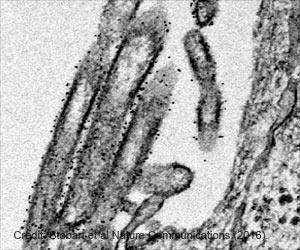- Nanobodies which could be used in the treatment of Respiratory Syncytial Virus (RSV) infections is developed by a research team from Geisel School of Medicine.
- The nanobodies are designed to bind to proteins expressed on the surface of the viruses.
- The proteins on the virus aid in entry into the lung cells. When the nanobodies bind to them, the viruses are prevented from entering the lung cells.
Nanobodies
The technology developed by the scientists target and neutralizes proteins expressed by the virus, blocking it from entering lung cells. This was possible by the use of single-domain antibodies, called Nanobodies. The study was published in the journal Nature Communications, detailing the interaction of the Nanobodies with the viral proteins and neutralizing them, along with their success in protecting mice from RSV infection and the associated inflammation.Producing Nanobodies
The scientists collaborated to generate and purify Nanobodies which targeted the unstable but active form of the RSV protein. On a more detailed study, it was found that these Nanobodies were closely associated with a conserved region of the viral protein, resulting in anti-viral reaction against different types of RSV.Dr. Xavier Saelens said that the scientists were successful in designing molecules which resulted in a potent reaction against RSV, in numerous clinical isolates in laboratory cell culture as well as in animals. The Nanobodies that were developed by these scientists have thus far been the most effective against RSV.
The small size of the Nanobodies allowed them to get attached to cavities that are present on the surface of the viruses, which prevented the viruses from entering cells in the lung.
Novel therapy against RSV
Nanobodies are attractive as a method of therapy since they- Are Stable
- Can be administered easily to the lungs
- Are Soluble
- Provide quick treatment
- Could be used to prevent hospitalization due to RSV
- Lower distress caused to patients
- Minimizes cost
Respiratory Syncytial Virus (RSV)
In healthy people this virus could lead to flu-like symptoms that may be mild. However, in infants as well as in older adults, RSV infection can be serious.- It is the most common cause of bronchiolitis, which is an inflammation of the lung airways
- It Is also the most common reason for pneumonia in children younger than 1 year of age(U.S).
- It results in 34 million illnesses among children below the age of 5 years.
- Two percent of cases require hospitalization.
- Treatment methods that are available are restricted to supportive care
- RSV is highly contagious, spreading via droplets infection when someone coughs or sneezes.
- The virus survives surfaces which include door knobs as well as counter tops
- It spreads among children in day care centers and older children pass it on to their younger siblings at home.
- In the U.S, it is found that almost all the children are affected by this viral infection, atleast once, by the time they are 2 years old.
Dr. Prof. Xavier Saelens says that the scientists had a goal of developing a novel method of treatment for this infection. This gave rise to the design of Nanobodies which were focused on the viral protein that was required by the virus to enter the cells of the lung. The Nanobodies were found to neutralize RSV, both in animal studies as well as in laboratory assays.
Making Way for Clinical Tests
The Nanobodies are being altered into a form which can be used in clinical trials, which will aid in understanding its significance among the general public. The scientists claim that they will not be working on developing a usable form of Nanobodies on their own, instead, they are looking at industrial support which will aid in better solutions for patients with RSV.Nanobodies are antibodies that are antigen-specific, recombinant and contain a single domain. They have a renewable source of reagents and have high production of a variety of expression systems. They are small in size, can dissolve easily in aqueous solutions and can recognize unique epitopes (part of the antigen molecule attached to the antibody itself). They are currently being used for a variety of research purposes but this is the first study to use Nanobodies in the treatment for RSV patients. This would provide a highly specific therapy for the deadly infection, aiding in an effective therapy.
- Respiratory Syncytial Virus Infection (RSV) - (https://www.cdc.gov/rsv/)
- About RSV - (http://kidshealth.org/en/parents/rsv.html)
- Nanobodies and their potential applications - (https://www.ncbi.nlm.nih.gov/pubmed/23730699)
Source-Medindia













